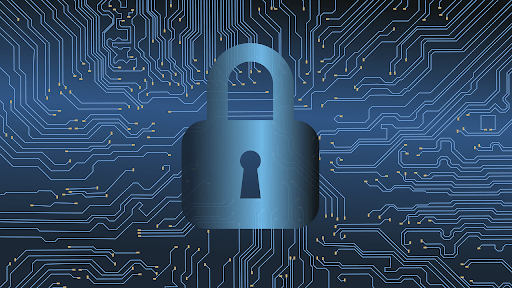Artificial Intelligence in Cybersecurity
Machine learning, deep learning, and artificial intelligence in cybersecurity are game-changing technologies in the fight against cyber-attacks. The technology learns and improves by analyzing previous attacks and predicting other types of attacks that may occur in the near future.
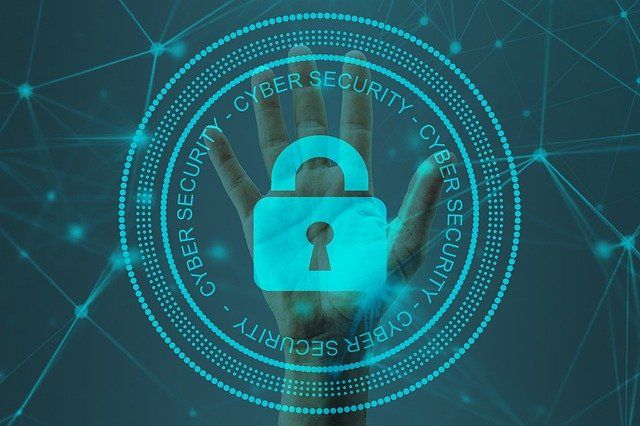
AI in cybersecurity is revolutionary by analyzing significant quantities of risk data, speeding up response time, and under-resourced security maneuvers. AI, machine learning cybersecurity and deep learning are becoming remarkable technologies in reducing cyber-attacks. According to a TechRepublic report, an average-sized company gets cyber alerts for over 200,000 every day. Hence, security experts of that company cannot deal with this great threat volume. Some of the threats that seem usual remain unnoticed and cause severe damage to the company in the future. Businesses invest billions of dollars in AI to introduce automation in their processes. The industrial IoT is expected to become a $500 billion market by 2050. The technology learns and improves by using past experiences and predicting varieties of attacks that may occur soon.
The global AI market in cybersecurity is forecasted to grow at $46.3 billion from 2020 to 2027, with a CAGR of 23.6%. Moreover, IDC (International Data Corporation) reported that cybersecurity funding are expected to grow at $174.7 billion globally by 2024, with high demand for security services.
However, the adoption of artificial intelligence in cyber security comes up with challenges as 60% of organizations have the most overall cybersecurity risks than the other ones. The ratio of online scams increased with the popularity of technology. Criminals are gaining full advantage of digitized systems as industries introduce technology in their operations; FTC reported about 4.8 million fraud cases in 2020.
1. WHAT ARE CYBERCRIMES?
Cybercrime can be briefly described as any illegal activity on digital platforms: fraudsters harm organizations and their representative for gaining access to financial data. Online scams can be done by using clients or businesses and making them fool by controlling their devices virtually. Lawmakers have issued cybersecurity protocols to encounter digital scams. Hence, cybersecurity highlights the strategies to secure systems against fraudulent digital threats. These crimes have the potential to destroy privacy-sensitive data and ruin business profiles.
2. WHY IS CYBERSECURITY NEEDED?
Just as securing stuff from online attacks is necessary, it is the utmost need to keep our online presence safe to avoid facing undesired events. Similarly, businesses possess cybersecurity measures to smoothly run work operations and protect their employees' critical information.
3. CHALLENGES FACED BY CYBERSECURITY
Attacks are becoming dangerous even with the advancement of cybersecurity techniques. The major challenges faced by cyber security are mentioned as:
3.1. Manual threat hunting: It is time-consuming and expensive, resulting in a higher number of unnoticed attacks.
3.2. Hackers can change and hide their IP addresses: Hackers use VPN (virtual private networks), top browsers, proxy servers, and other programs to stay anonymous and unidentifiable.
3.3. Geographically remote IT systems: Geographical distancing makes manual threat tracking complex. The professional cybersecurity experts should reduce the differences in infrastructure to monitor events successfully.
3.4. Reactive cybersecurity: Companies can only prepare themselves against already happened scenarios. Predicting threats before they happen is a great challenge in cybersecurity.
4. INTEGRATION OF AI IN CYBERSECURITY
AI is a crucial factor that uses automation to boost the productivity and efficiency of organizations. With digital transformation, AI has become one of the crucial techniques in protecting cyberattacks. Cyber AI can recognize patterns in data and allow security systems to learn from past experiences. Besides, with AI and ML techniques, organizations reduce instant response time and improve security practices.
The main points of artificial intelligence in AI are given as:
4.1. Detection: According to Capgemini's research, over 50% of organizations deployed AI cybersecurity solutions used it to aim detection. AI identifies irregular traffic sources with deep learning and machine learning capabilities.

4.2. Prediction: artificial intelligence in cyber security is also used to predict cyber threats earlier. Intelligent systems do it via scanning data and making relevant predictions. Further, this technology help detect critical vulnerabilities, network topology, and automatic asset identification while continuously focusing on their defense against cyberattacks.
4.3. Response: AI forms continuously evolve to detect and stop attacks simultaneously. Organizations can develop cost-effective and real-time AI solutions with the power of responding to breaches and alerting the holders about cyber threats.
5. WHERE ARE AI CYBERSECURITY DETECTION SYSTEMS USED?
AI for cybersecurity is used for several significant purposes, including
- Hunting threats efficiently.
- Forecasting attacks earlier.
- Retrieve the malfunctioned system by examining the main cause of attack to make it stronger than ever before.
- Excellent security monitoring.
6. EARLIER COMPANIES USING CYBERSECURITY AI
6.1. Google
Gmail used machine learning cybersecurity strategies to filter emails for 18 years ago back to its launch. Now, ML techniques are serving almost every industry via deep learning. It makes algorithms more independent with time for self-adjustment as they evolve. Elie Bursztein, head of Google's anti-abuse team, said that we lived in a world where more data is the problem, but now, the more the data, the better it is with deep learning.
6.2. IBM Watson
The IBM team has developed a cognitive learning platform that uses machine learning cybersecurity for threat detection. Koos Lodewijikx, the vice president of security operations at IBM Security, said that maximum work in the security section is repetitive and done manually. It would be great if these processes were automated with machine learning.
6.3. Juniper Networks
Digital companies are striving to introduce disruptive ideas to address the unsustainable economics of today’s networking issues. Junipers found its solution as offering an economically affordable Self-Driving Network. Kevin Hutchins, VP of strategy and product management at Junipers, said that the world needs autonomous networks. Advancements in AI, ML, and DL help attain automation, giving rise to autonomy.
6.4. Balbix
Balbix uses an AI-supported observative Breach Control Platform for sharing continuous threat predictions in real-time. The platform makes security teams stronger and more efficient at performing exceptional security services and maintaining a better position in society.
Before considering the benefits of artificial intelligence in cyber security, let's discuss how cybercriminals use AI in their operations to threaten humans?
7. AI IN CYBERCRIMINALS
AI in cybercriminals is used to do assault tasks by imitating human activities to distract security systems and results in artificial intelligence cyber attacks. For instance, fake account creation on social media and replying from these accounts using bots. These issues give AI human-like consideration that is complex to identify.
Cybercriminals also use AI to create intelligent malware systems with the potential of spreading worldwide even without detection. Researchers embedded malicious code in a neural network for image detection. Moreover, they minimized the loss of their system's efficiency by code integration. The team adjusted 36MB of malicious cod in 178MB template with adjusting accuracy drop up to 1% and ensuring that the code is not detectable by antivirus.
Deepfake is another type of AI in cybercriminals responsible for making fake videos. The cybercriminals get access to a user's sensitive information with these undetectable fake videos. Further, this fake-generated content may spread false communication of an executive person or ruin the reputation of a well-known celebrity.
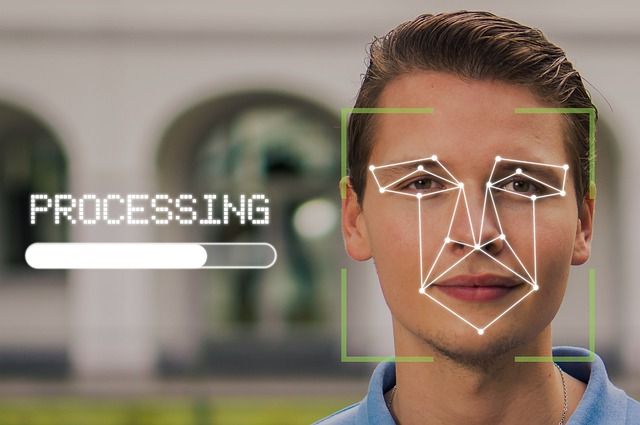
Cybercriminals are using artificial intelligence in security systems against humans, and they can also use it as a weapon in "AI war." They are using AI to combat the rising number of threats via analyzing a large amount of data, detecting unusual activity, and malware identification.
8. AI IN SECURITY BOOKS ON AMAZON
8.1 Hands-On Artificial Intelligence for Cybersecurity
The book shares popular AI approaches to identify potential cyberattacks. With it, the reader can understand machine learning and neural networks. Plus, you will create a digital system for detecting unusual patterns and attacks.
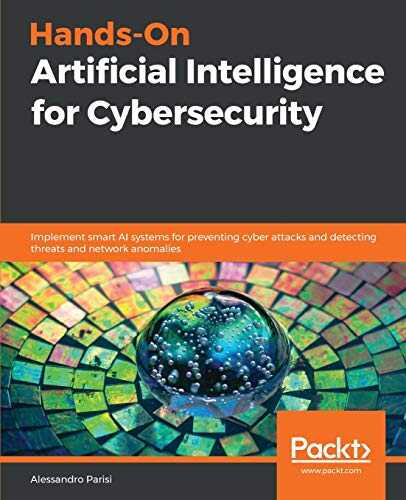
8.2. AI in Cybersecurity (Intelligent System Reference Library Book)
The book elaborates on the approaches of AI and cybersecurity, offering unique strategies for defense mechanisms against malware. It says knowledge of past cyberattacks is not enough to predict and avoid future attacks, but new approaches are demanded via AI.
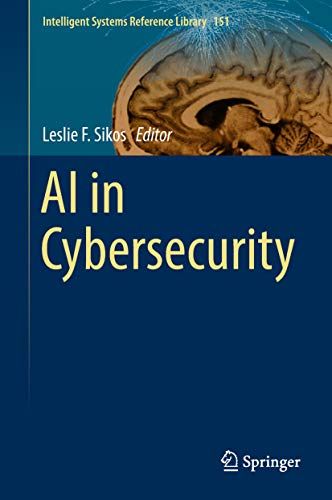
8.3. Practical AI for Cybersecurity
The book explains how Artificial intelligence security helps experts in controlling cybercrime and its practical implementation. It involves explaining automating repetitive routine tasks with machine learning and deep learning. Further, it shares recommendations on developing an excellent defense system.
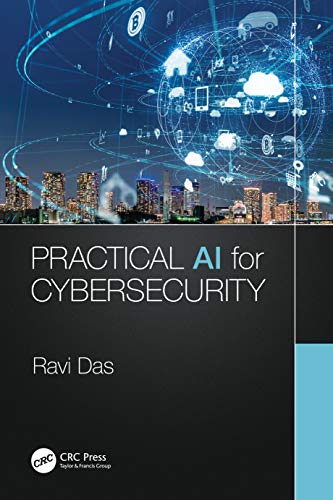
8.4. Artificial Intelligence for Cyber Security methods, Issues, and Possible Horizons or Opportunities
This book offers practical details about creating a stronger system against a powerful cyberattack. AI and ML strategies become must-to-use technologies for all types of businesses. Read it for a detailed analysis of the role of AI in cyber security.
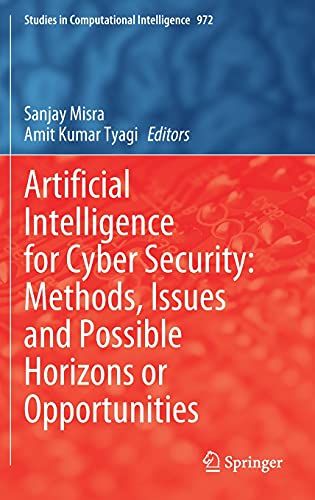
9. BENEFITS OF AI CYBER SECURITY
AI technology has potential benefits for the cybersecurity world. Some of them are discussed below.
9.1. Processing Large Volumes of Data
One of the most prominent applications of AI for cybersecurity is its ability to process large volumes of data efficiently. It is because it automates the algorithm creation process for detecting advanced security threats. The processed data covers everything, including files shared via email. Human scans cannot do this level of scanning performed by intelligent systems as human eyes roll too quickly to ignore irregularities. While on the other hand, AI performance is incredibly quick and thorough.

9.2. High Adaptability
AI-powered programs and applications use machine learning cybersecurity algorithms and deep learning to understand IT trends. Moreover, intelligent systems make changes according to the latest information or available data to respond to every coming situation better than before. Artificial intelligence in cyber security cannot replace human professionals right now but helps experts detect and solve malicious network behaviors instantly.
9.3. Early Detection of Unusual Cybersecurity Risks
An IT network is expected to face security risk in two ways; firstly, an unknown threat and secondly, a known attack that has already entered the system. Hackers specialize in invading undetected networks where cyber AI helps in eliminating or mitigating these advanced hacker strategies to a significant extent.
As hackers are always struggling to find new cyberattack forms and make them less detectable, some of them contain crypto-jacking malware attacks on smart devices of IoT (internet of things) and cross-site scripting.
9.4. AI Learns with Time
Deep learning is an excellent running technique where artificial intelligence in network security is involved. It helps understand and learn the network behavior over time. It notices a pattern of activities on the network and then joins them together. Then it uses these clues to find and detect activities against norms. After rightly detecting threats, it becomes easier to identify other threats in a shorter time. The constant ability of AI to improve itself with past experiences over time makes it harder for fraudulent activities to occur.
9.5. Better Vulnerability Management
A company may face multiple threats and risks regularly, and its needs of the hour to combat these vulnerability issues in real-time. AI-supported techniques help detection, identification, and prevention of various criminal attacks at a faster rate than human security can do.
When loopholes of organizations' computer systems are hacked and accessed consistently, it brings security issues at the front to be improved on priority. And AI helps make systems secure before a major loss occurs.
9.6. AI Offering Cybersecurity Solutions in Real-Time
Hackers launch their attacks from different time zones as they don’t have regular working hours. Therefore, it is necessary to monitor IT infrastructure in real-time to spot malicious cyberattacks and network breaches at their initial stage. AI-powered third-party solutions help IT security professionals, by eliminating the extra cost requirement on making the system more secure with the hiring of other experts. It is also an effective solution for achieving precise yet definitive detection of cyber activities that attract enterprises because of its improved diagnostic capabilities.
The integration of artificial intelligence in network security allows company holders to be more productive in resource management. However, enterprises must allow AI-powered solutions to perform security operations and security professionals to review threats diagnosed by AI for cybersecurity.
9.7. Eliminate Spams, Phishing, and Redundant Computing Techniques
ML algorithms are used to guard organizations effectively against phishing and spam attacks. Stealing one’s sensitive and confidential data comes under phishing techniques as accessing someone’s credit card, login details, and banking information. AI cyber security is here to efficiently identify malicious and suspicious emails to alert and protect a business or a person. Also, it is involved in eliminating redundant computing techniques to save IT analysts' time.
9.8. Securing Authentication Protocols
Many websites demand user login for making online payments or filling in forms for some purposes. Such businesses or websites need authentication protocols for backends safety purposes. AI can secure this system with another security layer by asking for physical recognition. Advanced AI cybersecurity techniques, including fingerprint scanners, reCAPTCHA, and facial recognition, identify a person on the other end of the loop instead of a robot. It then proves only authentic logins via accessing main data points.
9.9. Manages Duplicate Cybersecurity Processes
Cybercriminal keeps on changing tactics, but the basic security practices of organizations remain the same. So, it is not the right solution to hire a security expert as they may get bored of their job and miss an important security task leading to exposure of the network. Similarly, repetitive cybersecurity tasks could bore the security staff where AI in security helps check basic security threats. It analyzes the network carefully and finds if any threats are present, that may cause severe damage to your business in the long or short term.
9.10. Hunts Zero-Day Exploits
A zero-day attack is one of the biggest challenges in cybersecurity. It happens when perpetrators manipulate a software’s vulnerability by exploiting an unpatched susceptibility. Traditional security methods like antivirus software cannot detect or exploit these threats. Here deep learning help uncover hidden patterns and become more trained to identify zero-day attacks.
10. BENEFITS OF ARTIFICIAL INTELLIGENCE IN NETWORK SECURITY
A quick overview is here:
- Detecting viruses: AI is efficient at evaluating terabytes of data in a shorter time and unhide suspicious codes in fragments quickly.
- Creating a virus database: Artificial intelligence stores information and processes it to learn from past detected threats.
- Optimizing the functionality: Smart insights created by AI help enterprises improve their intelligent system and reduce the chances of further attacks.
- Predicting the moves of cybercriminals: AI-enabled systems analyze existing issues, security threats, and trends to forecast possible security developments.
11. DRAWBACKS OF AI IN CYBER SECURITY
AI offers exceptional benefits in cybersecurity but comes with some limitations. Let’s discuss:
11.1. Not 100% Secure
AI for cyber security is relatively a new strategy that is not advanced enough to offer 100% solutions. AI-based techniques should implement validation procedures to ensure network protection. In simple words, artificial intelligence in security systems alarm something that if found doubtful and flag it as threatening. It creates alerts for unusual activities, and then human analysts investigate them.
11.2. Expensive
The use and implementation of artificial intelligence in network security are increasing daily. It will also increase the demand for AI experts who will be less or hard to find. That's why spending more to get competitive personal or organizational security solutions is required. However, one should set the budget of creating robust artificial intelligence in security systems that achieves a high-security goal rather than spending blindly on the latest AI solutions.
CONCLUSION
Organizations predict that more hackers will start and keep using AI and cybersecurity in the future where specific security tools fail to overcome risk. Same way, organizations cannot afford heavy viruses, ransomware, malware, and other critical cyber threats. Adopting AI solutions help businesses to spend less effort and time on daily security tasks and keep their systems secure. Soon, no business will leave without AI in their systems; don't wait for custom tools to apply AI on; let's play via building personal security tools/ software.


